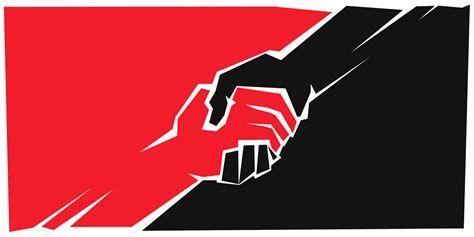The aim of anarchism is revolution, but we understand this revolution in a two-fold sense: Negatively speaking, what we are against is capitalism and the state. Positively, what we are for is the extension of democracy (direct, participatory democracy) to every institution of society.
The creation of democracy is (a fortiori) the destruction of the state because what makes a state a state is that it is a hierarchical and bureaucratic apparatus of power that sits separate to and above the people it governs.
The creation of democracy is the destruction of capitalism, which is a hierarchical and bureaucratic relationship in which we, the workers, are subordinated to the bosses and shareholders who direct and exploit our labour for profit.
Democracy is not voting for leaders to decide for on our behalf; an oligarchy selected by vote is still an oligarchy. No, democracy is the creation and changing of situations so that we can come together on the basis of equality to debate and to decide by voting directly on all the issues that affect us in common.
You asked about real-world projects, so how is this to be achieved in the real world and on a real-world scale?
Through the strategy of anarcho-syndicalism!
The International Workers' Association (IWA-AIT) is a federation of workers' unions organised and operating according to anarchist principles. Its aim is to advance and defend workers' interests against the capitalist and rent-seeking classes today, whilst building an organisation capable of carrying through social revolution tomorrow.
The key thing is that the organisations federated within the IWA are not waiting for tomorrow to bring democracy into being. To join is to start participating directly and immediately in the project of collective and individual autonomy.
Collective and individual autonomy are two sides of the same coin. You cannot achieve a full development of your individual autonomy unless you actively create and participate in social institutions that realise and practice collective autonomy, which is to say 'democracy' in its direct and participatory sense.
While the end game all anarchists work towards is social revolution – the extension of (direct, participatory) democracy to all institutions of society – we affirm our autonomy in the here and now by making the attempt to build organisations with this character.
Every meeting, every picket and every strike represents an event in which the power of capitalism and the power of the state meet resistance and are made to retreat.
Every attempt at organising and extending our organisation further demonstrates the fact of our thinking and acting for ourselves, both as individuals and as members of the working class.
This is what makes it a real-world project.
The revolution isn't some far‐off all-or-nothing event. The revolution is all the steps on the way to and through and past any single climax of struggle. And nothing that we do to support each other through the organisation and militancy of an anarcho-syndicalist organisation is wasted. This is what makes it realistic as a long-term strategy for revolution. The benefits of participation are direct and rewarding despite the distance to our end goal.
The values, actions, and forms of relationship, (equality, autonomy, solidarity, mutual aid, direct democracy, direct action, federation) that we put into practice today within our organisations are the same values, actions and forms of relationship that will characterise a future anarchist and libertarian socialist society.
And nothing builds confidence in oneself and real friendship with others than engaging in a struggle for better wages and conditions or to get sacked workers reinstated or compensated. We don't need the bureaucrats within mainstream unions to tell us how to do these things. We are more creative and achieve better results when we do it for ourselves.
We can do without the bosses and the bureaucrats and politicians, but they cannot do without us. That is our strength and our power. All we need to do is think, organise, and stand together when we act. We have the tools to do this. They are called anarcho-syndicalism and the IWA-AIT.






